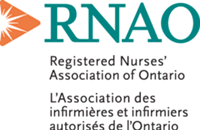TORONTO, Nov. 26, 2018 /CNW/ - The tragic circumstances surrounding the death of Brad Chapman will be examined in a Toronto courtroom at a coroner's inquest, beginning today.
Mr. Chapman was 43 years old and experiencing homelessness when he was found by a security guard in a downtown Toronto alley. The father of three died in hospital on August 26, 2015.
The Registered Nurses' Association of Ontario (RNAO) was granted status as a party to the inquest and is permitted to ask questions and make submissions. RNAO hopes the inquest will provide answers for Mr. Chapman's family, and bring much needed attention to the challenges facing those without a home. It will also shine a spotlight on the number of people who are struggling with addiction challenges and the services they and their families need.
"Brad Chapman was one of thousands of people who, at the time, didn't have access to supervised injection services," says Doris Grinspun, RNAO's CEO. Grinspun says such sites are vital for the province to reverse the growing opioid crisis, which claimed the lives of 867 people in 2016, and 1,265 people in 2017. "Staff at supervised injection and overdose prevention services opens a door of hope to people with substance use and addiction. They recognize people's vulnerabilities with the dignity they deserve. These services save lives and ease suffering," emphasizes Grinspun.
RNAO believes in an approach to health care that recognizes the social determinants of health and that addresses stigma and comprehensive harm reduction. The association's policy advocacy and clinical expertise are long-standing. It had intervener status during the 2011 Supreme Court of Canada case, which ruled that Insite, Vancouver's supervised injection services (SIS) facility, be allowed to remain open. The association also gave deputations before Toronto's Board of Health on the need for such services. And, in February of this year, RNAO released an evidence-based best practice (BPG) guideline with recommendations on how nurses and other health-care workers can meaningfully engage people who inject drugs and training approaches for health workers providing SIS. The guideline has been implemented widely by health professionals at home and abroad.
The RNAO hopes that its expertise in these areas will be a helpful contribution to the inquest.
"Nurses are on the frontlines of the overdose crisis and that's why the recommendations in RNAO's Implementing supervised injection services BPG are so important. Many people who inject drugs face social and health inequities. Their lives are no less important and they are equally deserving of care," says RNAO president Angela Cooper Brathwaite.
RNAO is the professional association representing registered nurses, nurse practitioners, and nursing students in Ontario. Since 1925, RNAO has advocated for healthy public policy, promoted excellence in nursing practice, increased nurses' contribution to shaping the health- care system, and influenced decisions that affect nurses and the public they serve. For more information about RNAO, visit RNAO.ca or follow us on Facebook and Twitter.
RNAO is represented by Tiffany O'Hearn Davies of Stockwoods Barristers.
SOURCE Registered Nurses' Association of Ontario

To arrange an interview, please contact: Marion Zych, Communications Director, Registered Nurses' Association of Ontario (RNAO), 416-408-5605, 647-406-5605, [email protected]

Share this article